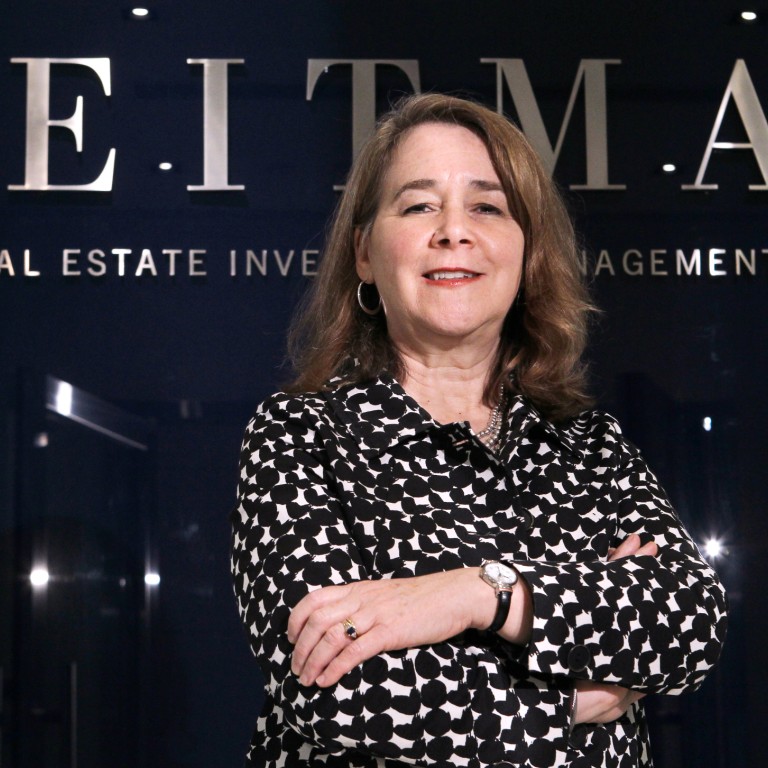
China’s logistics sector is hot, says asset manager
Mary Ludgin is a managing director at Chicago-based real estate management firm Heitman, which has about US$30 billion in assets under management worldwide.
She owns equity in the firm, where she has been for 23 years. Half of the company’s shares are owned by 32 senior employees, and the other half by Old Mutual.
Ludgin is the author of numerous articles and research studies related to real estate markets, portfolio management and strategy.
Q: Compared with North America and Europe, Heitman’s investment in the Asia-Pacific is relatively small. What is the history of the firm’s investments in Asia?
A: We opened our acquisitions office in 2008, but the global financial crisis interrupted that. We made our first investment in the region in 2011. It was in Australia. We invested in commercial office and industrial. The third investment was in a storage facility.
Q: What are your plans for the Asia-Pacific? Is it the right time to expand?
A: Yes, it is. We have subsequently invested in a retail investment in Kuala Lumpur. We are scouting opportunities across major markets in the Asia-Pacific, including mainland China and Hong Kong.
Q: Do you have any acquisition targets in China?
A: In light of the economic transition, structural shift, that is going on with the Chinese economy, our focus is likely to be those property types that are supported by demographic trends. That includes the elderly care sector.
We are also looking at logistics, recognising its importance for imports and exports and serving the need of the growing e-commerce sector.
Q: Which cities on the mainland are your targets?
A: Globally, the largest market has seen most significant capital inflow, but we find that they are often pricey at this point.
One of our strengths is looking for the next set of markets, secondary markets. It is one of our investment strategies in the US and Central Europe. Likely it will be the strategy here in this region.
Q: What will be the first investment in China?
A: I would say it will likely be a logistics investment. It is a hot sector now, a sector we know well.
Q: Will we see the first investment this year?
A: I cannot promise that.
Q: Is your company interested in the residential sector in China?
A: There is certainly demand there, but we do not think the bottom has been reached yet. We will be open to that when conditions are firm. But that will not be our first move.
Q: China is facing slowing economic growth. Does that create more opportunities for international funds?
A: It tends to be a great period for long-term, patient capital that waits for opportunities. What we want to make sure is to see good pricing for assets and good fundamental demand. Both need to be present.
Q: Do you expect capital prices of real estate assets to continue to drop?
A: I expect they will, in the light of the uncertainty of slowing GDP growth. That will create great opportunities.
Q: The US economy is improving, and so is Europe. What are the global capital flows? Do you expect to see a lot of capital going into China?
A: What we observe with our clients is a move up their risk spectrum in both the US and Europe, with significant interest in Asia, in the light of its relatively rapid economic growth.
Given the recovery of the European economy, some capital has shifted from opportunities in China to opportunities in Spain.
But no global investor will avoid investing in China. It is too powerful, it is too big. But it is complicated, so we need to be careful.
Q: Among the cities in the Asia-Pacific, which will see good growth potential in the next five years?
A: From our investment perspective, clearly Tokyo is an area of significant potential. Even as we are seeing the population declining in the country, Tokyo is growing. Our strategy is in residential, retail, offices. and storage as well. It is a rich place from an investment opportunity perspective.
Q: Under the company’s structure, 50 per cent of the company’s shares are owned by 32 senior employees and 50 per cent owned by Old Mutual. Can you tell us more about it?
A: Fifty per cent is owned by about 10 per cent of the professional staff of our firm. I believe it is rare among firms owned by partners.
Our financial partners provide us with capital – they are hands off when it comes to day-to-day operations. The structure produces profitability and alignment of interests.
Q: Do you have any unforgettable experiences?
A: I’ve led the research group for just under 20 years. During that time, we have helped Heitman expand its business into specialty property types such as self-storage that have delivered outsized returns and added considerably to our clients’ real estate portfolio performance. We began investing in the self-storage sector 17 years ago. Over that period, we have made US$5 billion in self-storage investments across 18 ventures.

